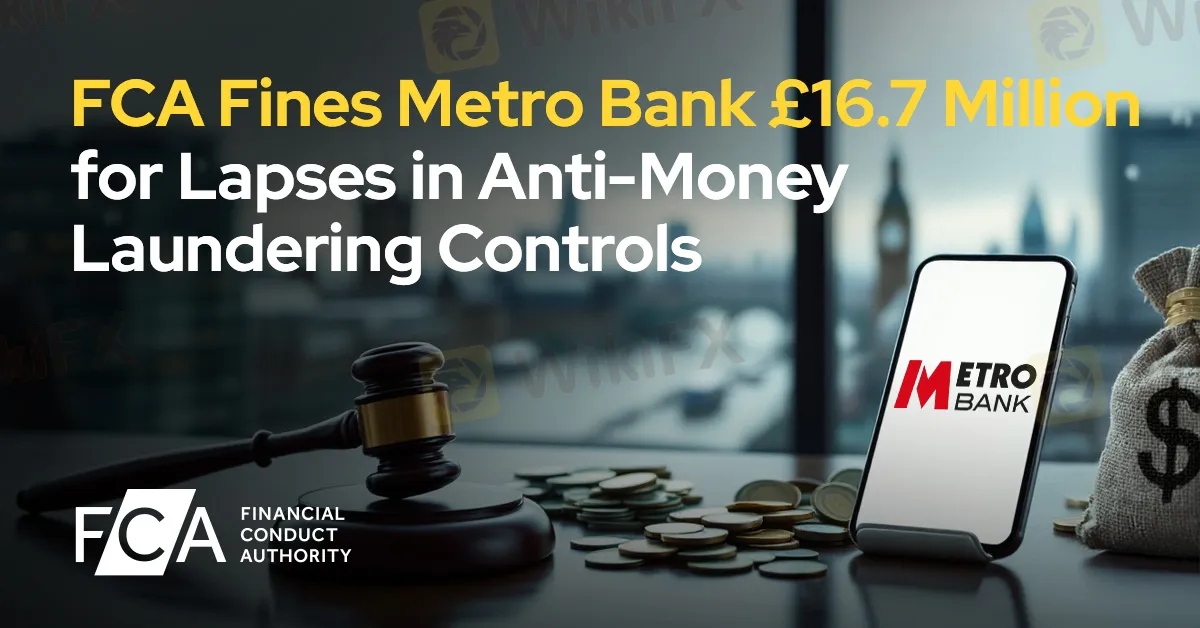简体中文
繁體中文
English
Pусский
日本語
ภาษาไทย
Tiếng Việt
Bahasa Indonesia
Español
हिन्दी
Filippiiniläinen
Français
Deutsch
Português
Türkçe
한국어
العربية
FCA Fines Metro Bank £16.7 Million for Lapses in Anti-Money Laundering Controls
Abstract:The Financial Conduct Authority (FCA) has imposed a £16,675,200 fine on Metro Bank PLC due to critical shortcomings in its financial crime prevention systems. Between June 2016 and December 2020, Metro Bank’s inadequate transaction monitoring controls left more than 60 million transactions, valued at over £51 billion, exposed to potential money laundering risks.

The Financial Conduct Authority (FCA) has imposed a £16,675,200 fine on Metro Bank PLC due to critical shortcomings in its financial crime prevention systems. Between June 2016 and December 2020, Metro Banks inadequate transaction monitoring controls left more than 60 million transactions, valued at over £51 billion, exposed to potential money laundering risks.
Transaction Monitoring Failures and Data Errors
Metro Bank automated its transaction monitoring for financial crime in June 2016, aiming to improve the detection of suspicious activities. However, a data integration error compromised the effectiveness of this system, preventing the monitoring of transactions occurring on the same day an account was opened and subsequent transactions until the account record was updated. This gap allowed numerous transactions to go unmonitored, creating vulnerabilities for potential financial crimes.
Despite concerns raised by junior staff in 2017 and 2018, the system's flaws went unresolved until mid-2019. The issue finally prompted action in July 2019, but the bank‘s remediation efforts did not establish a robust system to ensure that all relevant transactions were accurately monitored. It was not until December 2020 that Metro Bank achieved consistent transaction oversight, more than four years after the system’s initial deployment.
Corrective Measures and FCA Discount
Following its identification of the system‘s flaws in April 2019, Metro Bank implemented remediation measures to rectify the lapses. The FCA’s investigation revealed that the bank‘s lack of prompt corrective action had exposed it to severe risks over an extended period. While the FCA initially considered a fine of £23,821,700, Metro Bank’s cooperation and agreement to resolve the matter reduced the fine by 30% under the FCA's discount scheme.
FCA's Stance on Financial Crime Controls
This significant penalty reflects the FCA's firm stance on maintaining robust financial crime prevention mechanisms in the banking sector. The authority expects banks to implement proactive, effective monitoring systems to protect against money laundering risks and ensure compliance with regulatory standards.

Disclaimer:
The views in this article only represent the author's personal views, and do not constitute investment advice on this platform. This platform does not guarantee the accuracy, completeness and timeliness of the information in the article, and will not be liable for any loss caused by the use of or reliance on the information in the article.
Read more

WikiFX Review: Is FxPro Reliable?
Founded in 2006, FxPro is a reputable UK-based broker, trading on various market instruments. In this article, we will help you find the answer to one question: Is FxPro reliable?

Geopolitical Events: What They Are & Their Impact?
You've heard many times that geopolitical events have a significant impact on the Forex market. But do you know what geopolitical events are and how they affect the FX market? Let us learn about it today.

Why Do You Feel Scared During Trade Execution?
Trade execution is a pivotal moment for traders. It is when analysis turns into action, and potential profits or losses become reality. However, for many traders, this moment is accompanied by fear. Why does this happen, and how can you address it?

WikiEXPO Global Expert Interview: Simone Martin—— Exploring Financial Regulation Change
In the midst of financial innovation and regulation, WikiGlobal, the organizer of WikiEXPO, stays abreast of industry trends and conducts a series of insightful and distinctive interviews on pivotal topics. We are delighted to have the privilege of inviting Simone Martin for an in-depth conversation this time.
WikiFX Broker
Latest News
Geopolitical Events: What They Are & Their Impact?
Top 10 Trading Indicators Every Forex Trader Should Know
ASIC Sues Binance Australia Derivatives for Misclassifying Retail Clients
WikiFX Review: Is FxPro Reliable?
Malaysian-Thai Fraud Syndicate Dismantled, Millions in Losses Reported
Trading frauds topped the list of scams in India- Report Reveals
Why Do You Feel Scared During Trade Execution?
Revolut Leads UK Neobanks in the Digital Banking Revolution
Fusion Markets: Safe Choice or Scam to Avoid?
SEC Approves Hashdex and Franklin Crypto ETFs on Nasdaq
Currency Calculator


